
- Average Rating:
- Not yet rated
- Topic Areas:
- Workshops | Hypnosis | Aging and Mortality | Pain and Healing | Psychosomatics
- Categories:
- Erickson Congress | Erickson Congress 2001
- Faculty:
- Rubin Battino, MS
- Duration:
- 1:24:28
- Format:
- Audio Only
- Original Program Date:
- Dec 09, 2001
- Short Description:
- This workshop offers a grounded, compassionate look at using hypnosis and guided imagery with people facing serious medical diagnoses. Participants learn how language, expectation, imagery, and relational presence can support emotional resilience, coping, and a sense of agency alongside medical treatment. Through teaching, clinical stories, and live demonstration, the session shows how mind–body approaches can help clients work with fear, uncertainty, pain, and unfinished business without promising cure or denying medical reality.
- Price:
- $15.00 - Base Price
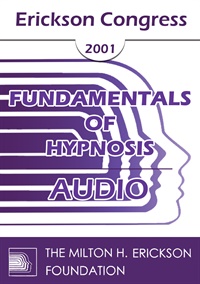
- Average Rating:
- Not yet rated
- Topic Areas:
- Fundamentals of Hypnosis | Communication | Hypnosis | Hypnotic Induction | Utilization
- Categories:
- Erickson Congress 2001 | Erickson Congress
- Faculty:
- Stephen Gilligan, PhD
- Duration:
- 2:05:58
- Format:
- Audio Only
- Original Program Date:
- Dec 09, 2001
- Short Description:
- Much of the effectiveness of hypnotic communication comes from nonverbal processes. This workshop will guide participants in how to develop, sustain and use these nonverbal connections for both induction and utilization purposes. Special attention will be given to using hypnosis as a poetic language that touches, evokes and engages the felt sense of a person's meaning making process.
- Price:
- $15.00 - Base Price
Tags: Fundamentals of Hypnosis
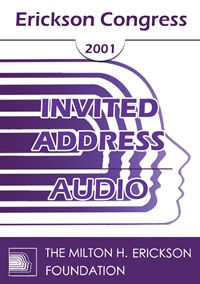
- Average Rating:
- Not yet rated
- Topic Areas:
- Invited Addresses | Ericksonian Psychotherapy | Meditation, Spirituality and Yoga | Psychotherapy
- Categories:
- Erickson Congress 2001 | Erickson Congress
- Faculty:
- Carl Hammerschlag, MD
- Duration:
- 57:51
- Format:
- Audio Only
- Original Program Date:
- Dec 09, 2001
- Short Description:
- IC01 Invited Address - Ericksonian Psychotherapy and Shamanic Healing - Carl Hammerschlag, MD The power to manipulate words and environments is a healing ceremony that moves patients beyond their limitations. Ericksonian psychotherapists and shamans understand that the process of change is an inner journey whose only prerequesite is a willingness to look within. Using words, stories, imaginary beings, rituals and ordeals, healers help patients illuminate the unconscious allowing them to create new ending to old stories.
- Price:
- $15.00 - Base Price
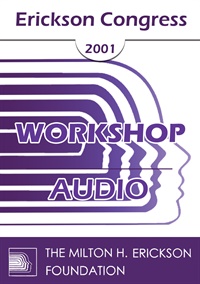
- Average Rating:
- Not yet rated
- Topic Areas:
- Workshops | Self-Hypnosis | Hypnosis | Mind-Body
- Categories:
- Erickson Congress | Erickson Congress 2001
- Faculty:
- Brian Alman, PhD
- Duration:
- 2:03:54
- Format:
- Audio Only
- Original Program Date:
- Dec 08, 2001
- Short Description:
- This workshop opens up a practical, experiential look at medical hypnosis and self hypnosis as tools for mind body healing. Participants see how simple breath based practices, individualized trance work and Ericksonian principles help people tap inner resources, ease chronic symptoms and support meaningful change in medical and behavioral conditions.
- Price:
- $15.00 - Base Price
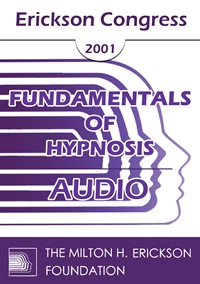
- Average Rating:
- Not yet rated
- Topic Areas:
- Fundamentals of Hypnosis | Hypnosis | Language of Hypnosis
- Categories:
- Erickson Congress 2001 | Erickson Congress
- Faculty:
- Jeffrey Zeig, PhD
- Duration:
- 2:16:58
- Format:
- Audio Only
- Original Program Date:
- Dec 08, 2001
- Short Description:
- Practitioners of hypnosis use a special grammar to elicit a special phenomenology. These linguistic forms can be applied to empower over psychotherapy even without formal trance. There will be lecture, demonstrations and practice.
- Price:
- $15.00 - Base Price
Tags: Fundamentals of Hypnosis
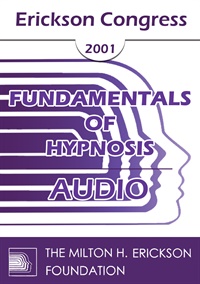
- Average Rating:
- Not yet rated
- Topic Areas:
- Fundamentals of Hypnosis | Hypnosis | Ericksonian Hypnosis and Therapy Techniques
- Categories:
- Erickson Congress 2001 | Erickson Congress
- Faculty:
- Michael Yapko, PhD
- Duration:
- 1:26:46
- Format:
- Audio Only
- Original Program Date:
- Dec 08, 2001
- Short Description:
- This session explores how hypnosis can enhance goal-oriented therapy by helping clients move from problems to tangible solutions. Participants learn to use hypnotic principles like focused attention, dissociation, and suggestion to amplify useful experiences, access inner resources, and build new skills. The session offers practical ways to structure sessions that make change more achievable, meaningful, and lasting.
- Price:
- $15.00 - Base Price
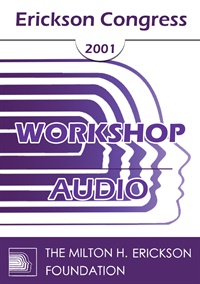
- Average Rating:
- Not yet rated
- Topic Areas:
- Workshops | Hypnosis | Pain and Healing | Psychosomatics
- Categories:
- Erickson Congress | Erickson Congress 2001
- Faculty:
- Rubin Battino, MS
- Duration:
- 2:02:39
- Format:
- Audio Only
- Original Program Date:
- Dec 08, 2001
- Short Description:
- This workshop offers a look at guided imagery as a therapeutic intervention for stress, pain, and medically related concerns. Participants learn how imagery, metaphor, and carefully chosen language can support relaxation, emotional regulation, and mind–body healing alongside medical care. Through teaching, research context, and extended live demonstrations, the session shows how to design client-centered imagery that fits individual belief systems, symptoms, and goals, making guided imagery a flexible tool in everyday clinical practice.
- Price:
- $15.00 - Base Price
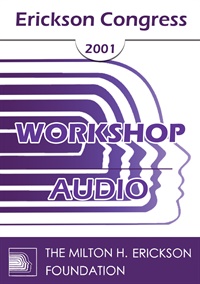
- Average Rating:
- Not yet rated
- Topic Areas:
- Workshops
- Categories:
- Erickson Congress | Erickson Congress 2001
- Faculty:
- Betty Alice Erickson, MS, LPC, LMFT
- Duration:
- 1:13:23
- Format:
- Audio Only
- Original Program Date:
- Dec 08, 2001
- Short Description:
- IC01 Workshop 42 - How Do You Make Them Do What They Need To Do? - Betty Alice Erickson, MS, LPC, LMFT
- Price:
- $15.00 - Base Price
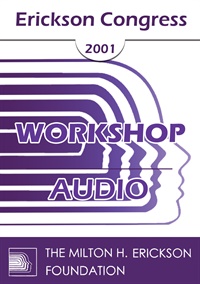
- Average Rating:
- Not yet rated
- Topic Areas:
- Workshops | Self-Hypnosis | Phobia | Hypnosis
- Categories:
- Erickson Congress | Erickson Congress 2001
- Faculty:
- Bernhard Trenkle, Dipl. Psych
- Duration:
- 1:49:45
- Format:
- Audio Only
- Original Program Date:
- Dec 08, 2001
- Short Description:
- IC01 Workshop 40 - Using Self-Hypnosis Training for Treating Phobias - Bernhard Trenkle, Dipl. Psych.
- Price:
- $15.00 - Base Price
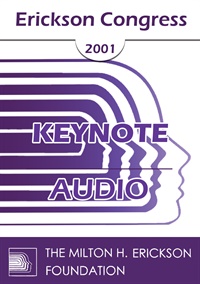
- Average Rating:
- Not yet rated
- Topic Areas:
- Keynotes | Psychotherapy | Social Issues | Humanistic Therapy | Systems Thinking
- Categories:
- Erickson Congress 2001 | Erickson Congress | Pioneers in Couples and Family Therapy
- Faculty:
- Cloe Madanes, HDL, LIC
- Duration:
- 1:01:26
- Format:
- Audio Only
- Original Program Date:
- Dec 08, 2001
- Short Description:
- Cloe Madanes shares her journey and insights, urging therapists to embrace their roles as humanist social activists. Drawing from her work in strategic and family therapy, she addresses issues like violence, sexual abuse, and institutionalization. She critiques the medicalization of therapy and the influence of managed care, advocating for ethical, human-centered practice rooted in social responsibility and emotional healing.
- Price:
- $15.00 - Base Price
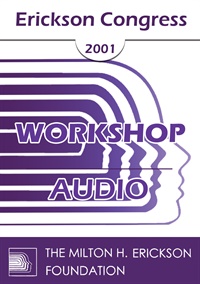
- Average Rating:
- Not yet rated
- Topic Areas:
- Workshops | Ericksonian Psychotherapy | Psychotherapy
- Categories:
- Erickson Congress | Erickson Congress 2001
- Faculty:
- Ernest Rossi, PhD
- Duration:
- 1:17:58
- Format:
- Audio Only
- Original Program Date:
- Dec 08, 2001
- Short Description:
- IC01 Workshop 39 - Facilitation of Gene Expression and Neurogenesis in Ericksonian Psychotherapy - Ernest Rossi, PhD
- Price:
- $15.00 - Base Price
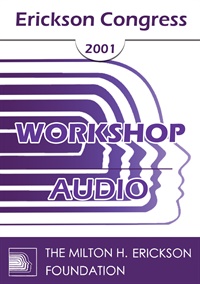
- Average Rating:
- Not yet rated
- Topic Areas:
- Workshops | Storytelling
- Categories:
- Erickson Congress | Erickson Congress 2001
- Faculty:
- Betty Alice Erickson, MS, LPC, LMFT
- Duration:
- 1:24:43
- Format:
- Audio Only
- Original Program Date:
- Dec 08, 2001
- Short Description:
- IC01 Workshop 36 - And Everyone Lived Happily Ever After: Therapeutic Story Telling - Betty Alice Erickson, MS, LPC, LMFT
- Price:
- $15.00 - Base Price
Tags: Storytelling
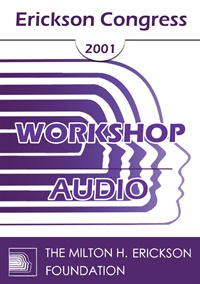
- Average Rating:
- Not yet rated
- Topic Areas:
- Workshops | Pain and Healing
- Categories:
- Erickson Congress | Erickson Congress 2001
- Faculty:
- Sandra Sylvester, PhD
- Duration:
- 2:11:06
- Format:
- Audio Only
- Original Program Date:
- Dec 08, 2001
- Short Description:
- IC01 Workshop 34 - Warriorheart: A Proactive Approach to Pain and Chronic Illness - Sandra Sylvester, PhD
- Price:
- $15.00 - Base Price
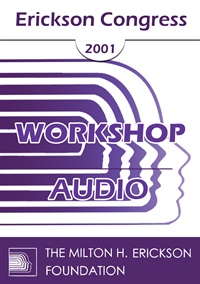
- Average Rating:
- Not yet rated
- Topic Areas:
- Workshops | Ericksonian Hypnosis and Therapy Techniques | Hypnosis | Psychology
- Categories:
- Erickson Congress | Erickson Congress 2001
- Faculty:
- John Edgette, PsyD
- Duration:
- 1:56:22
- Format:
- Audio Only
- Original Program Date:
- Dec 08, 2001
- Short Description:
- IC01 Workshop 33 - Ericksonian Hypnosis and Sport Psychology - John Edgette, PsyD
- Price:
- $15.00 - Base Price
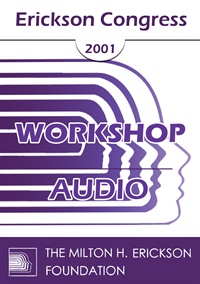
- Average Rating:
- Not yet rated
- Topic Areas:
- Workshops | Post-Traumatic Stress Disorder (PTSD) | Stress | Utilization
- Categories:
- Erickson Congress | Erickson Congress 2001
- Faculty:
- Maggie Phillips, PhD
- Duration:
- 1:50:27
- Format:
- Audio Only
- Original Program Date:
- Dec 08, 2001
- Short Description:
- IC01 Workshop 32 - Utilizing Symptoms of Extreme Stress/Complex PTSD - Maggie Phillips, PhD
- Price:
- $15.00 - Base Price
Tags: PTSD Stress Utilization
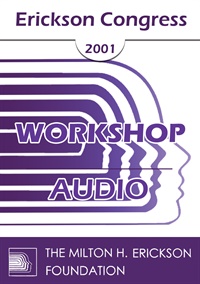
- Average Rating:
- Not yet rated
- Topic Areas:
- Workshops | Obsessive Compulsive Disorder (OCD) | Strategic Therapy
- Categories:
- Erickson Congress 2001 | Erickson Congress
- Faculty:
- Reid Wilson, PhD
- Duration:
- 1:42:43
- Format:
- Audio Only
- Original Program Date:
- Dec 08, 2001
- Short Description:
- Discover four powerful assignments that help clients take control of OCD — from postponing and altering rituals to introducing consequences that break compulsive cycles. This session blends practical tools with real case stories, showing how strategic disruption can reduce symptom intensity and increase motivation. Learn how to reframe obsessions, use techniques like loop tapes and worry time, and involve family in the treatment process. Includes insights on medication, the OCD-strep connection, and group brainstorming on complex cases like self-harm and hoarding.
- Price:
- $15.00 - Base Price
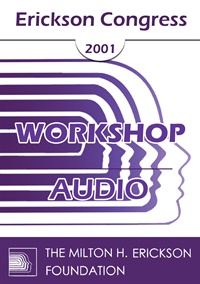
- Average Rating:
- Not yet rated
- Topic Areas:
- Workshops | Metaphors | Storytelling
- Categories:
- Erickson Congress 2001 | Erickson Congress
- Faculty:
- Ronald Havens, PhD | Catherine Walthers, LCSW
- Duration:
- 1:06:48
- Format:
- Audio Only
- Original Program Date:
- Dec 08, 2001
- Short Description:
- Participants will learn how to select and use metaphors and/or anecdotes to capture attention and stimulate an inner search for personal therapeutic meaning. Each participant will construct and experience the effects of metaphorical interventions.
- Price:
- $15.00 - Base Price
Tags: Metaphors

- Average Rating:
- Not yet rated
- Topic Areas:
- Workshops | Relationships
- Categories:
- Erickson Congress 2001 | Erickson Congress
- Faculty:
- Dan Short, PhD
- Duration:
- 2:06:10
- Format:
- Audio Only
- Original Program Date:
- Dec 08, 2001
- Short Description:
- IC01 Workshop 27 - The Need For Connection: Building Relationships That Are Therapeutic - Dan Short, PhD Therapeutic rapport is prerequisite not only to hypnosis but also to most forms of intervention. In this workshop, participants will learn strategies not commonly taught, such as how to develop a sincere interest in the well-being of clients whom you initially dislike, how to recognize and respond to the strength/fragility of the client's ego and when to use confrontation as a method of building trust and mutual respect.
- Price:
- $15.00 - Base Price
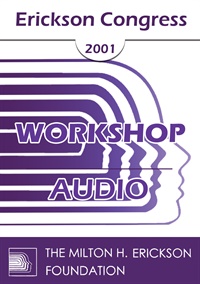
- Average Rating:
- Not yet rated
- Topic Areas:
- Workshops
- Categories:
- Erickson Congress | Erickson Congress 2001
- Faculty:
- Scott Miller, PhD
- Duration:
- 2:41:01
- Format:
- Audio Only
- Original Program Date:
- Dec 07, 2001
- Short Description:
- IC01 Workshop 15 - Working with the Unmotivated or Mandated Client - Scott Miller, PhD
- Price:
- $15.00 - Base Price
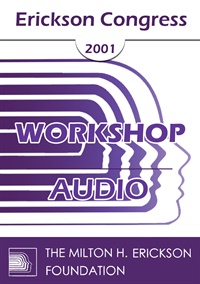
- Average Rating:
- Not yet rated
- Topic Areas:
- Workshops | Tailoring
- Categories:
- Erickson Congress | Erickson Congress 2001
- Faculty:
- Jeffrey Zeig, PhD
- Duration:
- 2:25:11
- Format:
- Audio Only
- Original Program Date:
- Dec 07, 2001
- Short Description:
- IC01 Workshop 14 - Tailoring - Jeffrey K. Zeig, PhD
- Price:
- $15.00 - Base Price
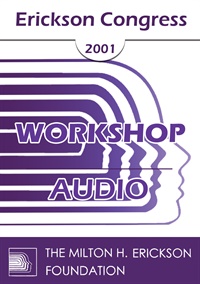
- Average Rating:
- Not yet rated
- Topic Areas:
- Workshops
- Categories:
- Erickson Congress | Erickson Congress 2001
- Faculty:
- Scott Miller, PhD
- Duration:
- 2:03:52
- Format:
- Audio Only
- Original Program Date:
- Dec 07, 2001
- Short Description:
- IC01 Workshop 13 - Client-Directed, Outcome-Informed Therapy - Scott Miller, PhD
- Price:
- $15.00 - Base Price
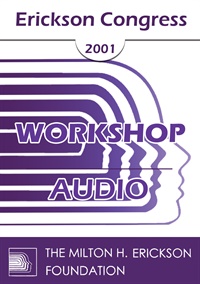
- Average Rating:
- Not yet rated
- Topic Areas:
- Workshops
- Categories:
- Erickson Congress | Erickson Congress 2001
- Faculty:
- Teresa Robles, MA, PhD
- Duration:
- 1:55:27
- Format:
- Audio Only
- Original Program Date:
- Dec 07, 2001
- Short Description:
- IC01 Workshop 11 - Indirect Work with Groups - Teresa Robles, PhD
- Price:
- $15.00 - Base Price
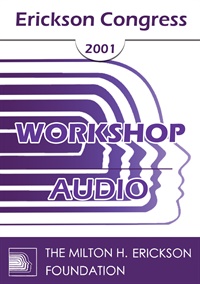
- Average Rating:
- Not yet rated
- Topic Areas:
- Workshops | Personality Disorders | Post-Traumatic Stress Disorder (PTSD)
- Categories:
- Erickson Congress | Erickson Congress 2001
- Faculty:
- John Beahrs, MD
- Duration:
- 2:18:00
- Format:
- Audio Only
- Original Program Date:
- Dec 07, 2001
- Short Description:
- IC01 Workshop 09 - Strategic Self-Therapy for Post Traumatic and Personality Disordered Patients - John O. Beahrs, MD
- Price:
- $15.00 - Base Price
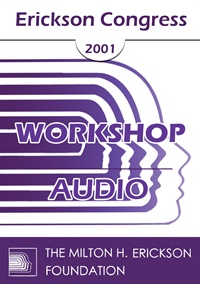
- Average Rating:
- Not yet rated
- Topic Areas:
- Workshops
- Categories:
- Erickson Congress | Erickson Congress 2001
- Faculty:
- Ronald Havens, PhD | Catherine Walters, LCSW
- Duration:
- 1:16:19
- Format:
- Audio Only
- Original Program Date:
- Dec 07, 2001
- Short Description:
- IC01 Workshop 07 - Writing Hypnotherapy Scripts: A Neo-Ericksonian Approach - Ronald Havens, PhD and Catherine Walters, LCSW
- Price:
- $15.00 - Base Price
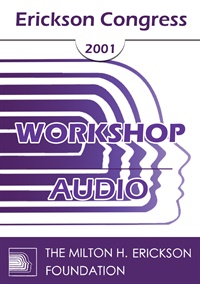
- Average Rating:
- Not yet rated
- Topic Areas:
- Workshops | Ericksonian Hypnosis and Therapy Techniques | Ericksonian Psychotherapy | Future Oriented
- Categories:
- Erickson Congress | Erickson Congress 2001
- Faculty:
- Brian Alman, PhD
- Duration:
- 2:09:46
- Format:
- Audio Only
- Original Program Date:
- Dec 07, 2001
- Short Description:
- This workshop looks at how Ericksonian principles can evolve with new technology, showing how personalized phone-based follow up, self hypnosis and everyday micro interventions help people carry therapeutic change into real life. Participants hear practical ways to extend rapport, strengthen self care and support long term improvement beyond the consulting room.
- Price:
- $15.00 - Base Price

